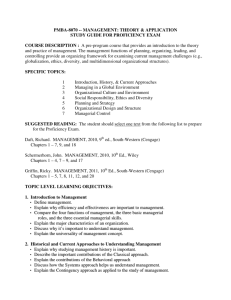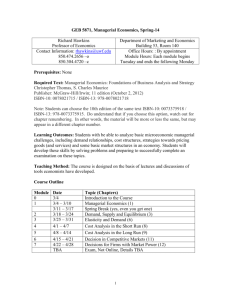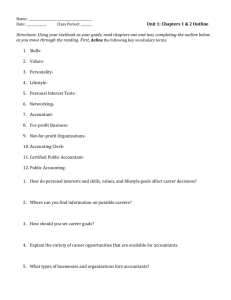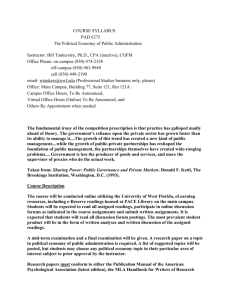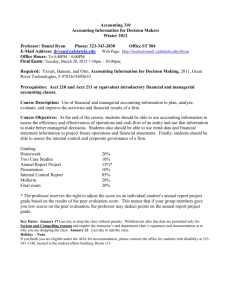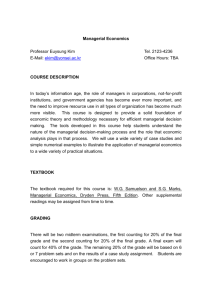THE UNIVERSITY OF WEST FLORIDA COURSE SYLLABUS COURSE: CLASS TIME:
advertisement
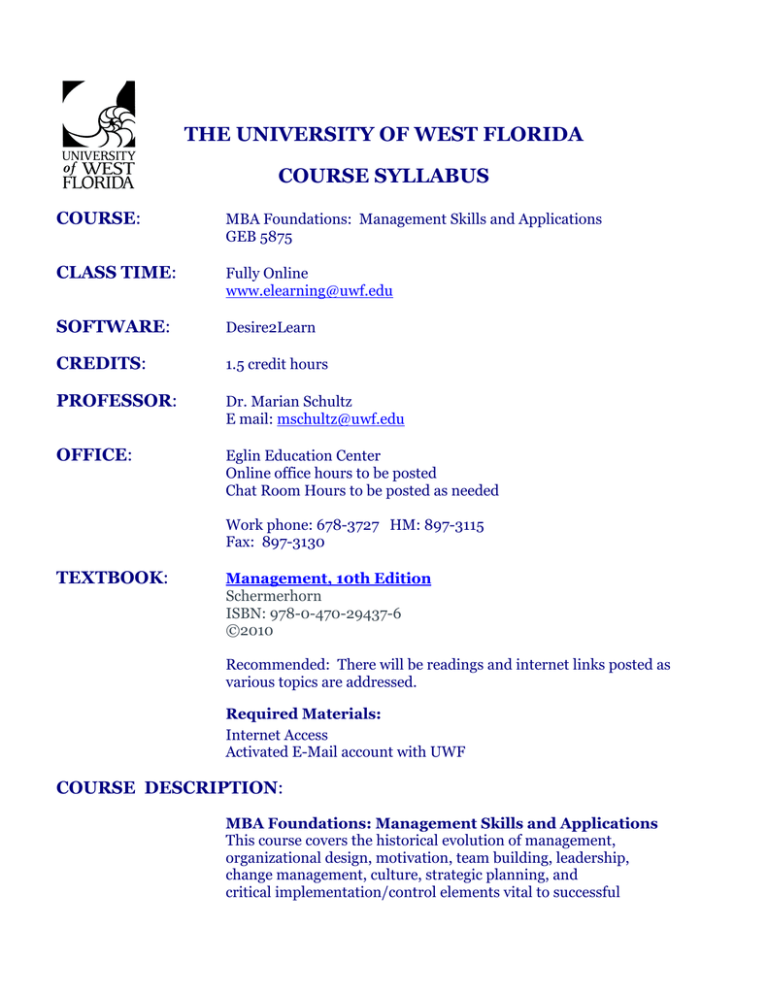
THE UNIVERSITY OF WEST FLORIDA COURSE SYLLABUS COURSE: MBA Foundations: Management Skills and Applications GEB 5875 CLASS TIME: Fully Online www.elearning@uwf.edu SOFTWARE: Desire2Learn CREDITS: 1.5 credit hours PROFESSOR: Dr. Marian Schultz E mail: mschultz@uwf.edu OFFICE: Eglin Education Center Online office hours to be posted Chat Room Hours to be posted as needed Work phone: 678-3727 HM: 897-3115 Fax: 897-3130 TEXTBOOK: Management, 10th Edition Schermerhorn ISBN: 978-0-470-29437-6 ©2010 Recommended: There will be readings and internet links posted as various topics are addressed. Required Materials: Internet Access Activated E-Mail account with UWF COURSE DESCRIPTION: MBA Foundations: Management Skills and Applications This course covers the historical evolution of management, organizational design, motivation, team building, leadership, change management, culture, strategic planning, and critical implementation/control elements vital to successful management and strategy. Social responsibility, ethics, globalization, and futures are also emphasized. COURSE FORMAT: This course is taught as a fully online course, utilizing the desire2learn software. It is essential that each student have consistent use of the internet in order to participate in the course. Each student will be required to participate in chat rooms, to post, read and comment on various assignments involving the discussion boards. LEARNING OUTCOMES: Upon course completion, students will be able to: 1. Recognize the nature of management activity and practice, as well as the systems and contingency approaches to management, as well as the systems and contingency approaches to management. 2. Discuss the impact on the management decisions and actions from forces in the industrial and international environments of an organization. 3. Comprehend the nature, operating principles, activities and theories that form the basis for controlling the management functions of planning, organizing, staffing, leading and controlling. 4. Recognize the organizational obligations regarding social responsibility and ethical behavior. 5. Describe the decision-making conditions, approaches, concepts, and techniques associated with managerial decision making. 6. Discuss the importance of creativity and innovation to the U.S. economy and organizations. 7. Recognize the challenges to organizations and management practice emanating from the globalization of business 8. Develop and refine one’s managerial style and philosophy COURSE OBJECTIVES: ☺ ☺ ☺ ☺ ☺ ☺ ☺ To understand applied management concepts To study management as a process, art and science To become involved with organizational dynamics To apply management skills in a team setting To participate in the diagnosis of daily management To become an involved member of an organization To identify, assess, and develop one’s own managerial style & philosophy Academic Conduct Policy: Academic Conduct Policy: (Web Format) | (PDF Format) | (RTF Format) Plagiarism Policy: (Word Format) | (PDF Format) | (RTF Format) Student Handbook: (PDF Format) Expectations for Academic Conduct/Plagiarism Policy As members of the University of West Florida, we commit ourselves to honesty. As we strive for excellence in performance, integrity – both personal and institutional – is our most precious asset. Honesty in our academic work is vital, and we will not knowingly act in ways to erode that integrity. Accordingly, we pledge not to cheat, nor to tolerate cheating, nor to plagiarize the work of others. We pledge to share community resources in ways that are responsible and that comply with established policies of fairness. Cooperation and competition are means to high achievement and are encouraged. Indeed, cooperation is expected unless our directive is to individual performance. We will compete constructively and professionally for the purpose of stimulating high performance standards. Finally, we accept adherence to this set of expectations for academic conduct as a condition of membership in the UWF academic community. UWF policies are in effect. Academic honesty is required of all members of a learning community. The University does not tolerate plagiarism on tests, examinations, papers, or other course assignments. Students who engage in such dishonesty will be given failing grades. If you are uncertain about proper documentation of sources, please e-mail me. Remember, if you directly quote or paraphrase someone else's words you must provide the full citation through a footnote. GRADED REQUIREMENTS: There are 7 basic course requirements: 2 examinations, participation, and a research paper with a ppt and PERT Chart, as part of a group project. The following schedule represents the points assigned for each of the course graded requirements. The exams are fully online. Graded Assignments 1. Exam 1 2. Exam 2 3. Group Paper Powerpoint PERT Chart 4. Participation 35% 35% 25% 5% Discussion board TOTAL 100% As in the practical world of management there will be responsibilities and tasks that are not directly compensated. While not all activities may be measured and applied toward overall assessment, additional gains may be in form of knowledge, understanding, contracts... A. Examinations (2) each exam will have 100 questions; no essays The exams will be completed fully online with objective questions covering the material. B. Group Paper & Presentation with PERT Each group will identify a specific company to research. The company social responsibility, demographics, hiring practices, structure, and other areas of interest should be researched. Each team will be responsible for coordinating a PowerPoint presentation to be posted to the discussion board. ☺ Company must be approved by the professor ☺ Early in the project development, a PERT Chart should be prepared to show the team plan for accomplishing the task. Include the pert with the paper C. Evaluation criteria for scoring the presentation: ☺ methodology; creativity; professionalism ☺ APA format is required for the paper ☺ creativity in presentation is encouraged i.e., games, show formats,... ☺ overall quality and clarity ...presentation should be interesting......materials professional in appearance...clarity of the presentation...thoroughness of material...presentation must reveal indepth knowledge of topic...presentation should be organized and follow a logical sequence. GRADE SCALE: Percentage 94-100 Grade A 90-93 A- 88-89 B+ 84-87 B 80-83 B- 78-79 C+ 74-77 C 70-73 C- 68-69 D+ 64-67 D 60-63 D- Below F Special Technology Utilized by Students: This course is totally online. All instructional content and interaction takes place over the WWW. In addition to baseline word processing skills and sending/receiving email with attachments, students will be expected to search the internet and upload / download files. In addition, students may need one or more of the following plug-ins: Adobe Acrobat Reader: http://www.adobe.com/products/acrobat/readstep2.html PowerPoint Viewer: http://microsoft.com/downloads/details.aspx?FamilyId=D1649C22-B51F-4910-93FC4CF2832D3342&displaylang=en Special Needs Assistance: Students with special needs must inform the instructor within the first week of the course term of any personal circumstances that may require special consideration in meeting course requirements or adhering to course policies. Students with special needs who require specific examination-related or other course-related accommodations should contact Barbara Fitzpatrick, Director of Student Disability Resource Center, SDRC@uwf.edu, (850) 474-2387. Student Disability Resource Center will provide the student with a letter for the instructor that will specify any recommended accommodations. THE UNIVERSITY OF WEST FLORIDA Module Schedule COURSE: GEB 5875 (May 9 – June 21, 2011) SCHEDULE OF CLASSES Note: Each week starts on Monday 7 am and ends the following Monday at 7 am (central). Module 1 is our first week. Remember that this course ends in June and will go by quite fast. Please do not ask for a discussion board to be reopened. The discussion board will open on Monday and the team (each team) will have the rest of the week to discuss and prepare a single team post. On Sunday morning (NLT 7 am central) each team is required to post the team response. The rest of Sunday is my time to read and reply. Each student should take the time to read the other team posts. You will not be required to reply to the posting or comment on them. Module 1 May 9 Readings • Read Chapters 1, 2, & 3 Topics • • Introducing Management Remember that self test questions are located at the end of each chapter; check your answers by looking up the correct responses at the back of the book • History of Management http://www.skymark.com/resources/leaders/taylor.asp http://le.www.ecn.purdue.edu/lE/gilbreth/ http://www.users/globalnet.co.uk/~cfg/mayo_is.htm http://www.eop.com/ Chapter 1 Objectives • • • • Identify today’s managers Classify managers Describe the functions and roles of managers Identify the managerial skills Chapter 2 Objectives • • Describe the contributions of Taylor, Gilbreths, Fayol, Weber, Maslow, McGregor, Argyris and the Hawthorne Studies to the field of Management Discuss how today’s managers use the behavioral approach to management • Discuss how the systems approach is appropriate for understanding management Explain the contingency approach and how it can be considered appropriate for today’s managers Chapter 3 Objectives • • • • • • Compare and contrast the omnipotent and symbolic views of management Describe the dimensions of organizational culture Explain the source of an organization’s culture Describe the components of the specific and general environments Competitive advantage Organizational culture Assignments (DB = Discussion Board) • • • • • DB: Design Team logo and name; post to discussion board DB: Post student introductions to the appropriate discussion board Self Assessments: p. 27 Career Readiness Self Assessment: p. 53 Managerial Assumptions Self Assessment: p. 82 Diversity Awareness Module 2 May 16 Readings Read Chapters 4, 5 & 6 Topics • • Ethical Decision Making Social Responsibility and Managerial Ethics Chapter 4 Objectives • • • • • Ethical role models Define exporting, importing, licensing, and franchising Corporate social performance Moral management Codes of ethical conduct Chapter 5 Objectives • • • • • Global management Types of global businesses Pros and cons of global corporations Cultural intelligence Values and national cultures Chapter 6 Objectives • • • • Individual versus group decision making Creativity in decision making Decision errors and traps Types of managerial decisions Assignments (send email to Dr. Schultz with project choice) Choose and discuss a company for the Team Project Ben & Jerry’s WalMart Xerox Harley Davidson ASA/Vision Coca Cola Pepsi Toys R Us Nike Ford GM Disney or other • • • Self Assessment p. 113 Individual characteristics Self Assessment: p. 144 Cultural Awareness Self assessment: Cognitive Style p. 175 • Team Assignment: Lost at Sea p. 176 complete individual ranking and then use either the chat room or private discussion board to come up with a group list. After completion, email Dr. Schultz to request the expert rankings Module 3 May 23 Readings Read Chapters 7, 8 Topics • • Foundations of Planning Strategic Management Chapter 7 Objectives • • • Types of plans Planning tools and techniques Describe each of the different types of plans Chapter 8 Objectives • • Describe the steps in the strategic management process Explain the growth strategies • • • • Discuss the BCG matrix and the business level strategies Describe the competitive strategies Self assessment p. 200 Time management Self assessment p. 230 Intuitive Ability Module 4 Midterm Availability: May 27-30 Module 5 May 30 Readings Read Chapters 9, 10, 12 Topics • • Traditional organization structures Organizational designs Chapter 9 Objectives • • • Organizational designs: mechanistic and organic Different types of structures Individual behavior Chapter 10 Objectives • • • • Organizational change Planned change Resistance to change Change strategies Chapter 12 Objectives • • • • Psychological contracts Perception Attribution Attitudes • Self assessment p. 259 empowerment/empowering others • Self assessment p. 289 tolerance for ambiguity • Self assessment p. 343 internal/external control Module 6 June 6 Readings Read Chapters 13, 14 Topics • • teams and teamwork communication and collaboration Chapter 13 Objectives • • • • • motivational theories process and content theories of motivation reinforcement theory motivation and job design reinforcement theories Chapter 14 Objectives • • • • stages of team development norms and cohesiveness task and maintenance roles decision making in teams Module 7 June 13 Readings Read Chapters 15, 16,17 Topics • • • conflict leadership control Chapter 15 Objectives • • • active listening space design conflict Chapter 16 Objectives • • Leadership traits and behaviors Contingency approaches • Issues in leadership Chapter 17 Objectives • • • • Control tools Steps in the control process Techniques Employee discipline systems types of controls • • • • Self assessment p. 399 team leader skills Self assessment p. 427 conflict management strategies Self assessment p. 477 after meeting/project remorse The PowerPoint presentations for your company should be finalized this week and posted to the discussion board June 21 Prepare for the final exam Research papers should be submitted by the June 21 • • FINAL EXAM Availability June 17-20 (The exam will close at 7 am central time on the 21st of June)

